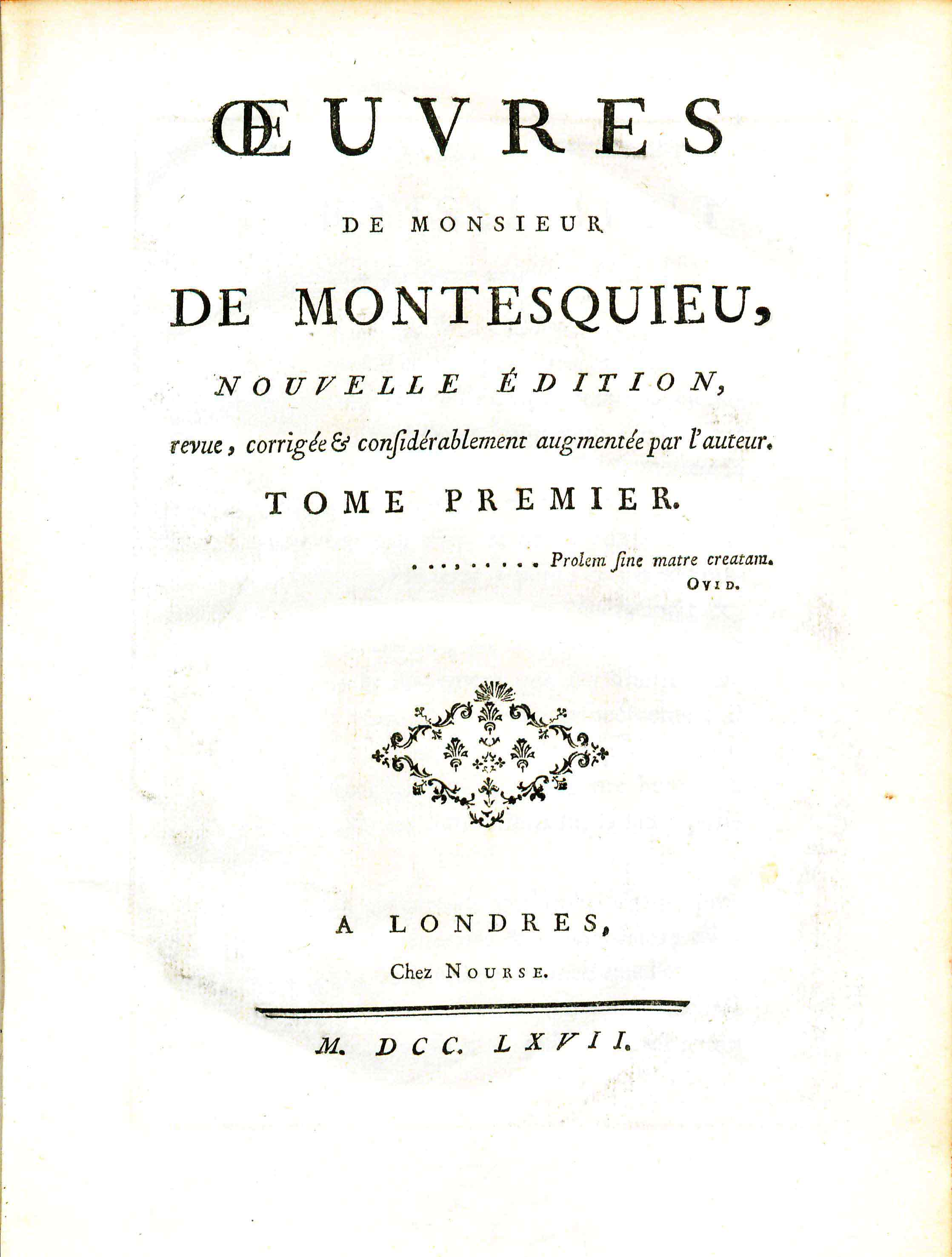Difference between revisions of "Œuvres de Monsieur de Montesquieu"
| Line 20: | Line 20: | ||
==Evidence for Inclusion in Wythe's Library== | ==Evidence for Inclusion in Wythe's Library== | ||
| − | + | While studying law under Wythe at the College of William & Mary, Thomas Lee Shippen wrote to his father describing his course of sutdy, "From breakfast to dinner, I read Blackstone, Hume, or Montesquieu."<ref>Letter from Thomas Lee Shippen to Dr. William Shippen, Jr. N. P. (Williamsburg) February 19, 1784.</ref>The [https://digitalarchive.wm.edu/handle/10288/13433 Brown Bibliography]<ref> Bennie Brown, "The Library of George Wythe of Williamsburg and Richmond," (unpublished manuscript, May, 2012) Microsoft Word file. Earlier edition available at: https://digitalarchive.wm.edu/handle/10288/13433</ref> suggests Wythe owned ''Œuvres de Monsieur de Montesquieu'' based on Shippen's reference and on a copy [[Thomas Jefferson]] sold to the Library of Congress in 1815.<ref>E. Millicent Sowerby, ''Catalogue of the Library of Thomas Jefferson'', 2nd ed. (Charlottesville: University Press of Virginia, 1983), 1:33-34 [no.2325].</ref> [[Dean Bibliography|Dean's Memo]]<ref>[[Dean Bibliography|Memorandum from Barbara C. Dean]], Colonial Williamsburg Found., to Mrs. Stiverson, Colonial Williamsburg Found. (June 16, 1975), 13 (on file at Wolf Law Library, College of William & Mary).</ref> lists "Montesquieu" under the section of titles Wythe assigned to his students citing a reference in William Clarkin's biography of Wythe.<ref>William Clarkin, Serene Patriot: a Life of George Wythe'' (Albany: Alan Publications, 1970), 156.</ref> The Wolf Law Library followed Brown's suggestion and purchased the 1767 edition of ''Œuvres de Monsieur de Montesquieu''. | |
==Description of the Wolf Law Library's copy== | ==Description of the Wolf Law Library's copy== | ||
See this book in [https://catalog.swem.wm.edu/law/Record/3630043 William & Mary's online catalog]. | See this book in [https://catalog.swem.wm.edu/law/Record/3630043 William & Mary's online catalog]. | ||
| − | |||
==References== | ==References== | ||
Revision as of 18:02, 9 March 2014
by Charles de Secondant, Marquis de Montesquieu
| Oeuvres de Monsieur de Montesquieu | |
|
Title page from Oeuvres de Monsieur de Montesquieu, George Wythe Collection, Wolf Law Library, College of William & Mary. | |
| Author | Charles de Secondant, Marquis de Montesquieu |
| Editor | François Richer |
| Published | Londres: Nourse |
| Date | 1767 |
| Edition | Nouv. éd. rev., cor., & considérablement augm. par l'auteur. |
| Language | French |
| Volumes | 3 volume set |
| Desc. | 4to (27 cm.) |
Œuvres de Monsieur de Montesquieu is the collected work of the Enlightenment-era French jurist, satirist, and political and social philosopher, Charles Louis de Secondat, Baron de La Brède and de Montesquieu (1689-1755). Born at La Brède, he received a progressive education at the Oratorian Collège de Juilly and an education in law at University of Bordeaux in 1708.[1] After completing his education, he inherited the barony of Montesquieu in 1716 and the office of Président à Mortier at the Parliament of Guyenne at Bordeaux from his uncle.[2] In 1721, he rose to national and international fame when he published his first work, Lettres Persanes (The Persian Letters). It was a critical commentary of European civilization, customs, and institutions from the point of view of three Persians traveling in Europe and thus created controversy.
Montesquieu continued to publish several works until his death. His most influential was, L’Esprit des Lois (The Spirit of the Laws). In this work, he argued that “only a constitutional government that separates its executive, legislative, and judicial powers preserves political liberty, taken as the power to do what one ought to will. A constitutional monarchy with separation of powers is the best form of government.”[3] This idea of the necessity of separation of powers in governments[4] was influential to the authors of the U.S. Constitution and the political philosophers Burke and Rousseau.[5]
Evidence for Inclusion in Wythe's Library
While studying law under Wythe at the College of William & Mary, Thomas Lee Shippen wrote to his father describing his course of sutdy, "From breakfast to dinner, I read Blackstone, Hume, or Montesquieu."[6]The Brown Bibliography[7] suggests Wythe owned Œuvres de Monsieur de Montesquieu based on Shippen's reference and on a copy Thomas Jefferson sold to the Library of Congress in 1815.[8] Dean's Memo[9] lists "Montesquieu" under the section of titles Wythe assigned to his students citing a reference in William Clarkin's biography of Wythe.[10] The Wolf Law Library followed Brown's suggestion and purchased the 1767 edition of Œuvres de Monsieur de Montesquieu.
Description of the Wolf Law Library's copy
See this book in William & Mary's online catalog.
References
- ↑ World of Sociology, Gale, s.v. "Montesquieu Baron de (1689 - 1755)," accessed September 26, 2013, http://www.credoreference.com/entry/worldsocs/montesquieu_baron_de_1689_1755.
- ↑ The Cambridge Dictionary of Philosophy, s.v. "Montesquieu," accessed September 26, 2013, http://www.credoreference.com/entry/cupdphil/montesquieu.
- ↑ Ibid.
- ↑ The New Dictionary of Cultural Literacy, Houghton Mifflin, s.v. "Montesquieu, Charles, Baron de," accessed September 26, 2013, http://www.credoreference.com/entry/hmndcl/montesquieu_charles_baron_de.
- ↑ The Cambridge Dictionary of Philosophy, "Montesquieu."
- ↑ Letter from Thomas Lee Shippen to Dr. William Shippen, Jr. N. P. (Williamsburg) February 19, 1784.
- ↑ Bennie Brown, "The Library of George Wythe of Williamsburg and Richmond," (unpublished manuscript, May, 2012) Microsoft Word file. Earlier edition available at: https://digitalarchive.wm.edu/handle/10288/13433
- ↑ E. Millicent Sowerby, Catalogue of the Library of Thomas Jefferson, 2nd ed. (Charlottesville: University Press of Virginia, 1983), 1:33-34 [no.2325].
- ↑ Memorandum from Barbara C. Dean, Colonial Williamsburg Found., to Mrs. Stiverson, Colonial Williamsburg Found. (June 16, 1975), 13 (on file at Wolf Law Library, College of William & Mary).
- ↑ William Clarkin, Serene Patriot: a Life of George Wythe (Albany: Alan Publications, 1970), 156.
External Links
Read volume one of this book in Google Books.
